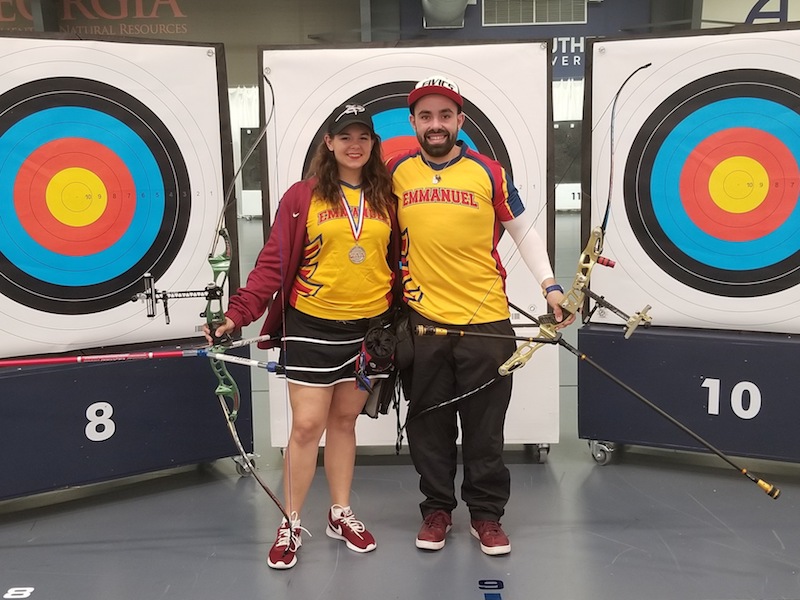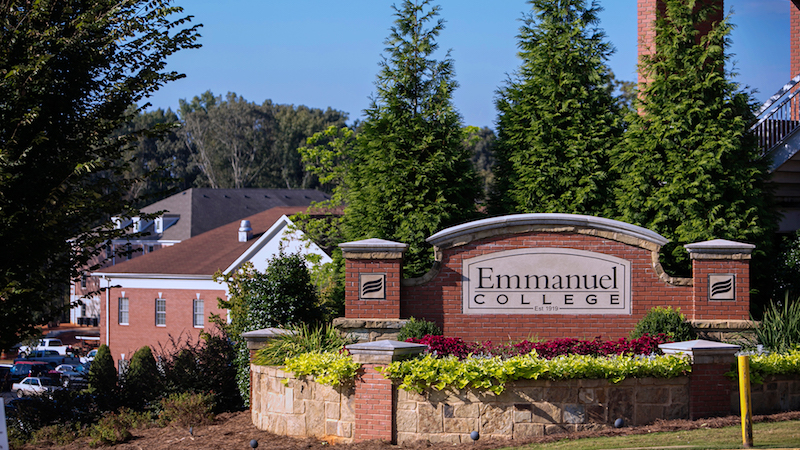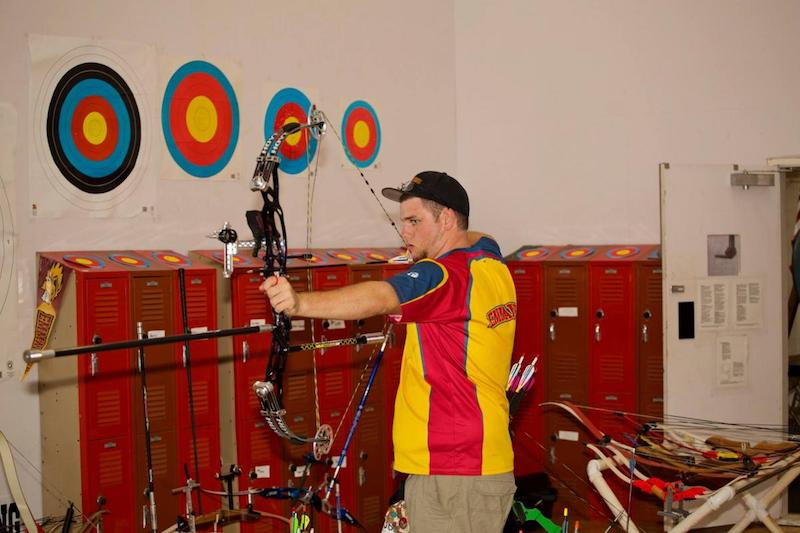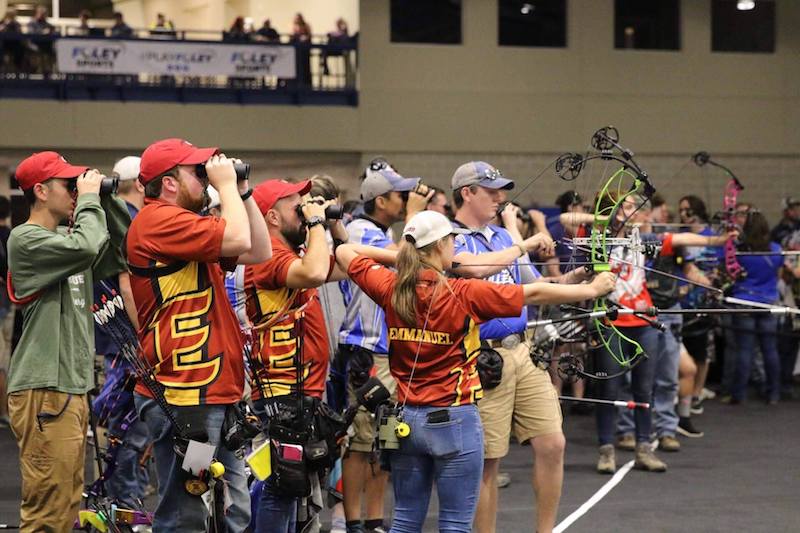Some archers hope to jump into a professional archery career after high school, while others pursue a college degree. Many schools like Emmanuel College in Franklin Springs, Georgia, offer archery scholarships. Scholarships let students blend archery and academics so they don’t have to give up either.

Rachel Reshonsky and Roger Hermosilla compete on Emmanuel College’s archery team, and both are building impressive resumés. Archery scholarships helped them pay for college, and unite them. They met on the team and are now engaged to marry.
Hermosilla is from Spain, and was born with an illness that affects his ability to play sports. After a local archery club visited his high school to do a promotion, he fell for the sport. “It became a cycle: the more I shot, the more I fell in love with it,” Hermosilla said.
Once he understood the dedication needed to reach the Olympics, he decided he needed a college education before going any further. His father reached out to Team USA archer Jake Kaminski on Facebook and Kaminski said Texas A&M and Emmanuel College were top colleges for archery, so Hermosilla applied to Emmanuel.
Reshonsky took a different route. “I started shooting when I was 2 years old,” she said. “I shot with the NASP program during middle school and high school using a Genesis bow. I transitioned into archery clubs, shooting with Music City Archery, then went to different camps and got into Olympic recurve shooting. I received a scholarship to shoot at Emmanuel College after I went to an archery camp there.”
At Emmanuel’s summer camp, archers spend a week practicing, learning and improving techniques. They spend time on campus and stay in dorms. The camp enlists college students as counselors so they can complete their USA Archery certifications and practice coaching.
About Emmanuel College

Emmanuel is a small college of about 2,000 students, which strengthens ties between students and faculty. “The line between team and family gets closer every day,” Hermosilla said.
Emmanuel’s archery team is a varsity program. It has the same regulations and benefits as other sports, and archers receive as much respect as football players from students and teachers.
“It’s great to be able to sit down with the president of the school and the school board and have them ask, ‘How’s the archery team doing? What do you need? How do you think the program is going to grow at the school?’” Hermosilla said. “When we finished Nationals, we got an email or a phone call from the president of the school saying, ‘Congratulations!’ I don’t think that would happen at a state university.”
Hermosilla and Reshonsky competed at the U.S. Field Nationals, winning gold and silver, respectively. “We had the full team behind us,” Hermosilla said. “With my family being overseas, having people there to support you is great.”
“It’s exciting to see how enthused their friends are when they watch them compete,” Coach John Winchester said. “They’re not just teammates, they’re friends.”
Winchester has only coached for a year at Emmanuel, but already feels at home with his team. “I haven’t met an archer I didn’t like,” Winchester said. “When I came up to the college to look at it, there was nothing going on at the campus. I said, ‘I need to come back when there’s students.’ The minute I saw the students, I said, ‘This is a great group of people.’” Winchester is confident any new archer visiting the school will be sold on it after watching the team interact.
Logistics

The scholarships range from $2,000 to almost a full ride, depending on the archer’s skills and potential. As archers improve, their scholarship increases. The scholarships are for archery only, but students could also receive academic scholarships on top of it.
Potential collegiate archers shouldn’t worry that the team won’t offer their discipline. Winchester notes that every coach knows and coaches all four disciplines: barebow, bowhunter, open compound, and Olympic recurve.
What do Recruiters Seek?

What do archery recruiters seek when scouting potential scholarship recipients?
“A good personality and someone who’s a good archer,” Winchester said. “They don’t have to be a perfect archer. That’s what I’m there for. Also, a person that will be able to handle the academics.”
Hermosilla and Reshonsky want to remain in the archery community after graduating, and would love to coach. They want to pursue master’s degrees, and become assistant coaches or create their own collegiate program. “The number of archers drops from JOAD to senior level,” Hermosilla said. “Collegiate programs can change that.”
Archery isn’t just for those who covet the Olympics. They can follow different paths and still practice archery. “There wasn’t an option to pursue a degree and shoot archery before,” Winchester said. “If you wanted to be an archer, you had to drop everything and become a resident athlete.”
Archery is also about knowing yourself, and being in tune with your mind and body. Collegiate archers continue using the sport’s skills and focus long after graduation. “In archery, you have control of yourself, your breathing and your techniques,” Hermosilla said. “Archery is really good for people with anxiety. Archery helps you forever. Even when you stop shooting archery, it helps you in life.”
The focus archery requires translates to real-world situations. “I am severely dyslexic, and I have a hard time processing things,” Reshonsky said. “School and archery work together to make me better. If I have to learn something new in archery, it helps teach me how to learn something new in my other classes.”
Winchester agrees, and acknowledges archery’s real-life benefits. “Confucius was an avid archer and he said something like, ‘When you miss the target, you don’t get to blame anybody else. You have to look at yourself,’” Winchester said. “I think that’s why you see archers becoming friends with their opponents.”
Archery is truly a passion for these students. “At tournaments, I may get stressed and freak out sometimes, but when I’m on the line shooting, I feel powerful,” Reshonsky said.
If you share this passion for archery, and you hope to pursue a degree, consider looking at colleges that offer archery scholarships. If you think Emmanuel is right for you, and you’d like to apply for a scholarship, visit the school’s website for the list of requirements and instructions for requesting recruitment.



